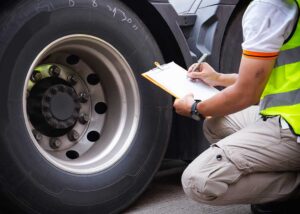In the aftermath of an accident involving your truck, the “he said/she said” approach makes poor evidence and does nothing to prove which party is at fault.
Whether you’re defending yourself to law enforcement officials, insurance adjusters or a judge and jury, factual, irrefutable evidence is vital. To that end, many carriers have turned to dash cams and in-cab video recording services.
The practice is opposed by some drivers — and to be sure, many carriers subscribe to services that not only provide the camera(s) but also monitor videos and utilize information sent from the truck’s electronic control module. Doing so allows the company to match incidents like hard braking with the corresponding video, providing a better record of what actually happened.
Some carriers take it a step further, installing cameras that record the inside of the cab, including the driver. The services the carriers subscribe to view video from all recorded angles and make a judgement whether the information is worth passing on to the carrier’s safety department or other representative.
Those who invest in their own trucks often do so for the greater independence of being an owner-operator. And many drivers believe that video recording capabilities today create an invasion of privacy, especially when the lens is pointed at the driver.
However, the cold, hard truth is this: If you own your truck and it isn’t equipped with at least a front-facing dash camera, you could be risking your business and your livelihood.
Camera systems are available for owner-ops and small fleets.
Of course, for most owner-operators, a subscription service would be too expensive (if it can be found at all for a carrier with only one truck). That’s why purchased dash camera systems are a better option.
Some owner-ops are content with a forward-facing camera only. Many available cameras have wide-angle lenses that record the area in front of the hood, as well as much of the area to the sides of the hood.
However, there are systems available that can handle multiple cameras. Some, designed for cars and small trucks, have a forward-facing lens plus a remote lens that’s mounted on the rear of the vehicle and used for backing up. There are also systems that can connect to cameras on both sides of a Class 8 tractor in addition to a forward-facing dash cam.
Whatever configuration you choose, make sure none of the mounted lenses or the display device obstruct are positioned so that they obstruct your view. The Federal Motor Carrier Safety Administration (FMCSA) doesn’t allow anything to be mounted on any part of the windshield that could obstruct the driver’s vision. Some drivers prefer a dash mount or a “sandbag” type mount that can be moved when necessary.
Consider system memory and other features.
Once you’ve decided on the type of camera and mount, consider the amount and type of memory you’ll need. For example, if there are four lenses, the device will be recording four videos at once. That takes a lot of memory.
Some devices have large internal memories, while some utilize SD or mini-SD cards for storage. These work well for transporting the recorded videos to a laptop computer, but not for displaying video on your phone or tablet.
Some cameras are equipped with Bluetooth capability; this allows you to access and display videos on your phone or tablet. This can be very useful at the scene of an accident when you want to show the video to law enforcement. You may even be able to share the video files via email or text.
Most recorders keep a record that includes more than just video.
Some record GPS information that may include your vehicle’s speed in addition to events recorded by the device’s accelerometer, such as hard braking, swerving or an impact. Many devices automatically save the video when one of these events is detected. You’ll want to be able to choose what is recorded and turn off any that you don’t want. For example, an accident might have been caused by someone else — but if your device recorded that you were driving a few miles over the speed limit, that information could actually harm your case in court.
Another feature many cameras include is audio recording.
In some cases, this might allow you to record instructions from a police officer (if it’s not illegal in the jurisdiction you’re in). Keep in mind, however, that it will also record any other sounds you make while driving, like conversations, singing and comments directed toward other motorists (we all know these are usually not overly nice!). You’ll want to be able to disable audio recording, unless you’d like to hear the audio played in court.
Quality dash cameras offer several ways to save video.
In most models, video is automatically saved until the memory is full; then the system begins to overwrite the oldest videos. Most devices save the videos in segments of one to five minutes, depending on the model.
Triggered video saves — those caused by a bump or swerve hard enough to be detected by the device’s accelerometer — are saved in a different file so they are not overwritten when the memory gets full.
Another type is user-saved video. Most devices have a button (or even a voice command) that allows the driver to instruct it to save video in a unique file, so it won’t be overwritten. This is handy when no impact occurs but the driver wants to record another accident, weather event or even the license number of another vehicle.
Make sure the process for saving video is a simple one, preferably a single button or a voice command. During stressful moments it can be difficult to remember multiple-step instructions. Also, make sure you know how to play back videos at the scene if you’re involved in an accident. Doing so could save you a citation or an at-fault determination.
Know the legalities.
The use of video cameras may be illegal in some jurisdictions, while others have specific laws addressing what can be done with recorded video. Some require the permission of anyone being videoed, and some prohibit posting videos on social media or anywhere they can be viewed by the public. It’s best to only share your dashcam videos for private purposes.
Always keep in mind that if you’re involved in an accident, a dash camera system can exonerate you of fault … but it can also prove you were responsible. You may be asked if you have such a system or even asked to surrender the system or the memory card, so be prepared.
Cliff Abbott is an experienced commercial vehicle driver and owner-operator who still holds a CDL in his home state of Alabama. In nearly 40 years in trucking, he’s been an instructor and trainer and has managed safety and recruiting operations for several carriers. Having never lost his love of the road, Cliff has written a book and hundreds of songs and has been writing for The Trucker for more than a decade.









Great article! I preach about this all the time. Hopefully 5 years from now everyone will realize the importance of dashcams!